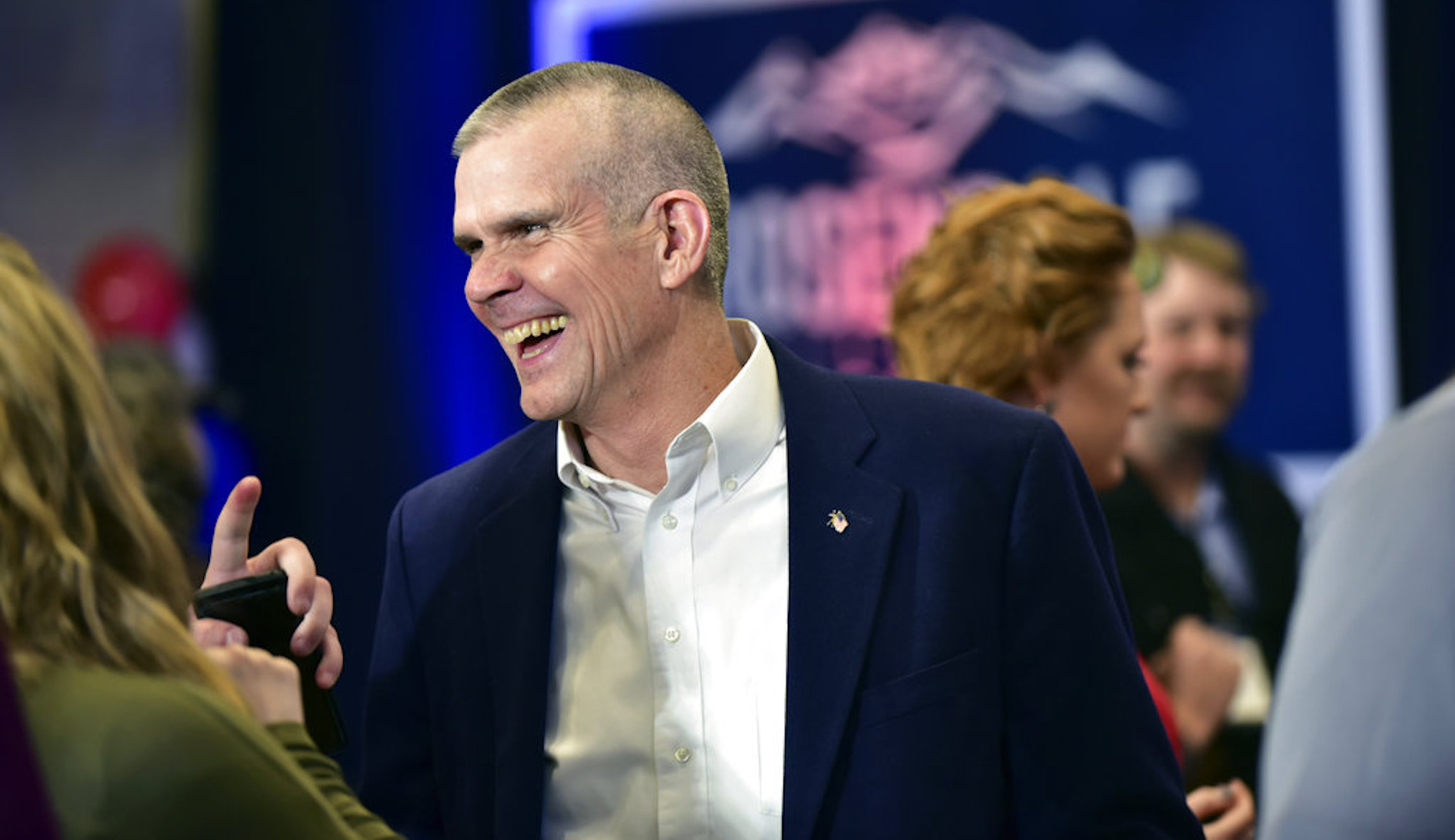From being among the first to call for Wyoming Rep. Liz Cheney’s ousting to taking heat for objecting to Afghan evacuees being settled in his state, Republican Rep. Matt Rosendale of Montana is making a splash during his first term in Congress and becoming known for spicy press statements that prompt national attention.
Rosendale, 61, speaks with a sharp intensity and piercing eye contact that matches his fiery press statements that do not mince words. But he does not quite fall in the category of political rabble-rousers chiming in on every headline of the day simply to get noticed.
“I don’t just go out there and ready, fire, aim,” Rosendale told the Washington Examiner. “The best managers make good decisions faster. There’s a lot of people that wait a long time and struggle over the same information and the details and the facts don’t change, and finally, when they see a lot of other people making a decision, then they’ll jump on.”
“If you’re going to be effective, you have to be the person that steps up,” Rosendale said. “Have I always been like that? Absolutely.” He said that trait helped make him successful in business as well as politics.
Rosendale and Arizona Rep. Andy Biggs, chairman of the House Freedom Caucus, were the first two House Republicans in January to call for Cheney to resign as conference chairwoman, the No. 3 leadership position among House Republicans, over voting to impeach former President Donald Trump after the Jan. 6 Capitol riot. The two discussed it on the House floor, and then Biggs told the Washington Examiner that Cheney should resign just before Rosendale released a statement saying that Cheney was “weakening our conference at a key moment for personal political gain.”
REPUBLICANS SAY SWIFT AFGHAN RESETTLEMENT MAY ‘OPEN OUR BORDERS TO A TALIBAN-RUN NATION’
After Cheney was removed from the position in May, Rosendale tweeted a photo of the “mission accomplished” banner that hung over former President George W. Bush on an aircraft carrier during a 2003 speech.
He also got national media attention for a statement explaining why he did not vote to make Juneteenth a federal holiday, calling it part of “larger efforts to make Critical Race Theory the reigning ideology of our country.”
Most recently, Rosendale objected to the resettlement of 75 Afghans in Montana, a low number compared to the thousands of an initial group of 37,000 who will head to other states. He suggested that the United States settle evacuees “in other countries around Afghanistan that share their values and culture, especially if we can not ensure proper vetting.”
“Say what you want, but their culture is different,” Rosendale told the Washington Examiner. “Ninety-nine percent, OK, of the Muslims that leave Afghanistan believe in Shariah law. They embrace it, that’s their culture. Why wouldn’t we locate them in countries that are surrounding that area, Uzbekistan, Tajikistan, where their culture is very similar so that once they do have stability and civility in Afghanistan, they can actually return to their home country?”
Rosendale said that coming into Congress, he warned his staff: “There’s going to be days that we’re going to take flak. We’re going to take heat.”
He has four main areas of focus: his work on the Veterans’ Affairs and Natural Resources committees, plus issues revolving around healthcare and immigration.

Being the son of a newspaperman exposed Rosendale to politics from a young age, and Rosendale says that his conservative, small-government views have remained largely consistent through the last 40 years.
“I was an ‘American First’ person before anybody even had it copyrighted,” he said.
His parents started and ran a small newspaper on Maryland’s Eastern Shore, the Bay Times. By his teenage years, Rosendale was equipped with a 35 mm camera, taking photographs for the paper. He remained engaged with politics as he started a family and built a real estate business.
Rosendale and his family moved from Maryland to rural Eastern Montana in 2001, fulfilling a longtime goal of buying property in a cold, dry climate with access to hunting and fishing. Mounted deer heads and ducks in his congressional office demonstrate bring a bit of that atmosphere with him to Washington. The Cowboys, a 1972 John Wayne Western set in Montana, ranks among Rosendale’s all-time favorite films.
“I only went to town, like, on Sunday to go to church, and the rest of the week, I was riding horses and chasing cows around,” Rosendale said. “It’s a close, close community. It’s really a wonderful, wonderful lifestyle.”
Before being elected to Congress in 2020, Rosendale was the state auditor for Montana and a state legislator in both the House and Senate, including as Senate majority leader. But he is not a stranger to national politics. He was Montana’s Republican Senate nominee in 2018, narrowly losing to Democratic Sen. Jon Tester, and he ran an unsuccessful House GOP primary in 2014.
The most “disappointing” part of the shift from state politics to Congress is the “complete lack of respect for process, procedure, and rules,” Rosendale said. “This is like coming into Alice in Wonderland.”
CLICK HERE TO READ MORE FROM THE WASHINGTON EXAMINER
But he is up for playing hardball.
“The Freedom Caucus is absolutely positively in the right spot to try and slow down this very, very destructive agenda,” Rosendale said, referring to the conservative caucus’s strategy to call for votes on bills that would normally be passed by unanimous consent, delaying and even defeating some of them. “I think that there have been many missed opportunities because we didn’t have the rest of the Republican conference to join us.”
But don’t take Rosendale’s intensity and long political resume as a sign that he is aiming to become a decadeslong institution in Congress.
In 10 years, Rosendale said, “I want to be back at my ranch in Montana with Washington, D.C., in my rearview mirror, one-third the size that it is today.”

